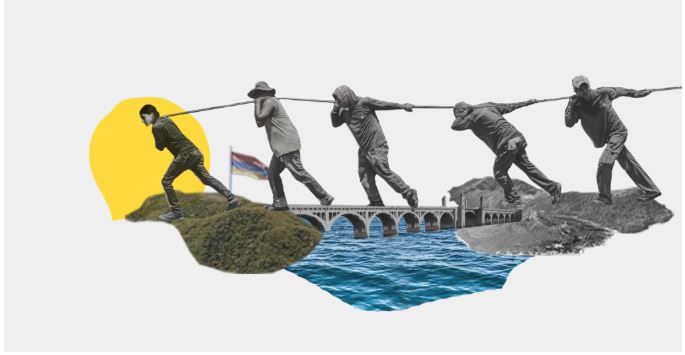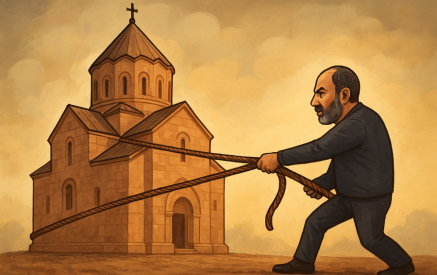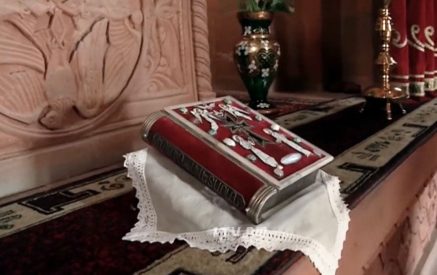Stepan Piligian
The term “diaspora” is used so often in our communal discourse, one would think that it would have a very descriptive definition. The term comes from the Greek root meaning to “scatter about.” It has been traditionally applied to the Jewish people and their historic separation from their homeland for centuries. The term became applicable to the Armenians as a direct result of the Genocide, starting with the Hamidian atrocities and continuing through the Ittihad Ottomans. As a result, since the 1920s a growing majority of Armenians have resided outside of their homeland. Armenians continued to live in the eastern portion of their historic territory, but eventually millions made their homes in host countries who welcomed the Genocide survivors. In the early years of the post-World War I diaspora, there were hopes that the displaced generation would return to the “Hairenik.” With the exception of a late 1940s repatriation effort to Soviet Armenia, it remained only a dream.
What happened over the next decades has been nothing short of a miracle. Instead of remaining an underserved population and assimilating into their new countries, the Armenian diaspora maintained its values of education and a strong work ethic. In South America, the Middle East, Europe, the United States, Canada and as far away as Australia, Armenians thrived in all chosen professions, contributed to their adopted societies and built “new Armenias” where they lived. It is a remarkable story of growth and resilience. Even when economic and civil disorder caused secondary migrations, the Armenians were adaptable and survived. As the community gained strength, the unfinished business of justice for the Armenian Genocide (Hai Tahd) emerged as an additional responsibility accepted by the diaspora. This evolved into a professional and effective advocacy capability. Guided by the survivor generation, succeeding generations became the beneficiaries of western education, and countless stories of successful Armenians were common. The diaspora was a convenient term but was hardly a synonym for “integration” or “organization.” The diaspora began with individual efforts and grew as such. Even the tragic split in the Armenian church (and essentially the community) could not deter progress. In the 40s and 50s, the impact of assimilation had been minimal, and the division actually inspired some competition that spurred growth. Even as the signs of assimilation became evident in the 60s through the 80s, they were essentially neutralized by significant migration from the Middle East that would replenish diaspora communities.
Read also
When Armenia and Artsakh gained their independence in 1991, the diaspora was functioning as a large collection of semi-independent organizations and institutions. Affiliations were usually through legacy political connections. Those sympathizing with the Dashnagtsoutiun would usually go to Prelacy churches, the AYF, Homenetmen, ARS and Hamazkayin. Traditional links to Ramgavar or Hunchak backing would emerge as Diocese churches, ACYOA, AGBU or Tekeyan. Thankfully, the edges have softened over the years through dialogue and marriages. The Knights and Daughters of Vartan are good examples of diversity in national service. We have been blessed with excellent service-oriented infrastructure with generations of dedication. Yet in the interest of being candid, it is fair to state that we have fallen short in areas of collaboration. It is less impactful within our communities but is quite visible in our dealings with the homeland. We work with incredible dedication but as silos. There is some improvement, as the churches do much more together, and joint April 24 events are common. This trend will continue until all the walls are down, because the young generation has little commitment to legacy alignments. The bigger issue with our youth is keeping them interested in what the previous generation has gifted them.
If you observe the diaspora from Armenia and Artsakh’s perspective, you may gain valuable insight. It is to our benefit to view the challenges from that angle. The diaspora continues to operate with independent organizations, each carving out some niche in the homeland. The motivations are honorable, but the approach has significant limitations. In view of the recent tragedies we are experiencing as a nation, it is an opportune time to re-examine our approach.
Armenia’s modern independence year of 1991 and the diaspora remind me of an American western movie I watched recently. The government was opening up the Oklahoma territory to settlers in the 19th century. There was a simple approach. All the wagons, buggies and carts lined up and, when given the word, raced to locations to stake their claim. The diaspora continues to be an overly decentralized entity that is underutilized. Everyone is working for the betterment of the nation and will continue to make a difference. Yet I believe that our performance as a diaspora has begun to stagnate. Some people are disenchanted and tired. Others will bring innovation and energy. Despite the incredible dedication of all these groups, let’s ask a simple question: Has the diaspora with its significant wealth, incredible talent and nearly seven million people optimized its impact on the homeland? What I hear most say is absolutely not. Assuming there is some truth to that observation yet no organizational solution, then most will ignore the problem, believing that something is better than nothing. This is noble, but the problem remains. We can do better. It is particularly evident in the economic and national security domains where the diaspora can make a sizable impact. If we only look at the challenge from our perspective, then it is easy to criticize Armenia. We hear that we are not welcome, that they just want our money and that relations are stagnant. If we truly care about the future of the homeland, then we would not be dissuaded by any complication. What have we done to make the diaspora a more efficient and collaborative entity by organizing for success? When you live in a silo, you tend to be too focused on your own turf to be concerned about the greater whole. Talking about serving Armenia and not improving the effectiveness of the diaspora are not compatible thoughts.
The idea of improving the infrastructure of the diaspora can return significant results but is fraught with risk. Certainly this idea has been discussed for years, but given the current state of the homeland, our urgency to change should be foremost in our thinking. Most intra-communal challenges remain unresolved, not because a solution is not possible, but as a result of prevailing power motivations and egos. You can apply this logic to small problems at the parish council or local level as well as to larger organizational conflicts. Will and leadership are essential. Both usually emerge during times of crisis. Perhaps our time will come as groups such as the Future Armenian and others examine these dynamics and push for change. The idea of “organizing” the diaspora (at least the western diaspora) is usually met with resistance (or at least eternal debate) over who will lose power and how each silo will be impacted. This is where we need a bit of an attitude adjustment.
Is it the organization or the mission that we are focused on? If it is the former, you will do good work and only appeal to the supportive target audience. If it is the mission, you will do great things and appeal to the greater nation. Many of us have been involved in our communities for many years, and this dilemma has always been visible. Instead of just producing zealots for an organization, how about teaching passion for the mission? This will reduce inter-organizational conflict and enable new structures to emerge. When a corporation that serves a particular market begins to stagnate, it considers restructuring to enable new growth in its market. Our market is the global Armenian nation. Our mission is the prosperity and security of that nation. Everything else is merely a vehicle.
A pan-Armenian integration designed to optimize the diaspora support of the homeland should have several components that must be debated (but not for too long). Are members representing organizations or individuals? Are there individual advisors? Is it a representative body like the House of Representatives where larger groups have more seats, or is it an equal representation group like the U.S. Senate? One of the more interesting aspects of this effort would entail determining how to gain the respect and trust of Armenia. One idea I heard recently from a friend in California would be to require that members be dual citizens with Armenia. This would address the issue of “outsiders” participating in Armenia’s affairs and bridge the credibility gap. Another concept is that the plenary body be broken into several standing committees on topics such as defense/national security, education, infrastructure, economy, social programs and intelligence.
These resources would build relations with the appropriate ministries in Armenia to define areas of support. This should not limit the work of any diaspora organization in Armenia. It is intended to take a more deliberate approach going forward to improve the overall effectiveness of the diaspora. The other observation we should internalize is that this will be a “messy” process. Collaborating can start modestly and grow as trust in the process occurs. It will take strong and visionary leadership from some of the larger stakeholders, such as the hierarchical Sees of the church, ARF, AGBU and others, to lead for a brighter future.
I would encourage all to embrace the concept of a more integrated diaspora before arguing the specifics. The purely decentralized independent model that has fueled the growth of the diaspora can no longer energize the underutilized potential for the homeland. As with any vision for the greater benefit, we must be ready to compromise in order to reach new heights.
What must be foremost in our minds is the benefit of a more organized and effective global model to protect our national interests. It is tragic to witness the needs of the homeland and the untapped potential of the diaspora. It is time to move forward with a global vision that brings the full capacity of the Armenian nation into reality. It will energize the diaspora while bringing security and prosperity to the homeland. Sustaining the identity of the diaspora lies in the homeland. The mutual benefits are a natural state.






















































